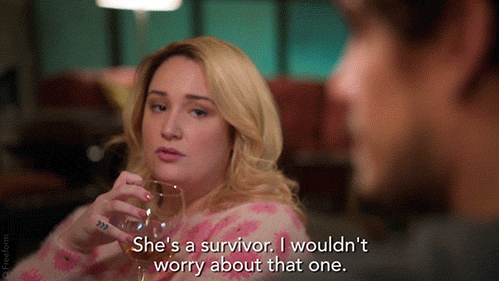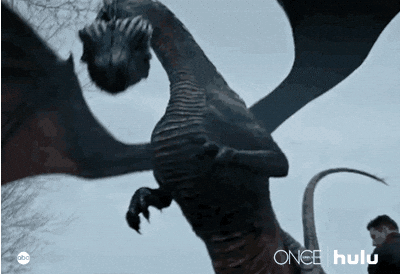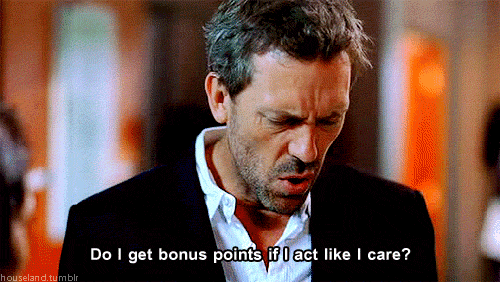Book Review: Fourth Wing
TL; DR: The dragons are cool, but I did not care one bit about any other character.
Okay.
I read Fourth Wing.
And it did nothing for me.
(But I kind of liked the dragons.)
And if you only read that far, you know enough.
If you’re curious about all the rest of my feelings? Keep reading.
When I said I was going to write more book reviews, I also said I didn’t want to be a jerk. I still don’t want to be a jerk. I debated whether to even post my real thoughts about Fourth Wing. I did give it three stars (because dragons), but it’s really only a two-star book for me. I could have let sleeping dogs lie, but the thing is, fantasy is my genre. It’s a genre I care about deeply, and I’m super disappointed in the direction it’s going. So at the risk of sounding like a jerk, I’m sharing my whole opinion.
I doubt Rebecca Yarros’s royalties will suffer because of my review.
Here’s the Amazon blurb for Fourth Wing:
Enter the brutal and elite world of a war college for dragon riders from #1 New York Times bestselling author Rebecca Yarros
Twenty-year-old Violet Sorrengail was supposed to enter the Scribe Quadrant, living a quiet life among books and history. Now, the commanding general―also known as her tough-as-talons mother―has ordered Violet to join the hundreds of candidates striving to become the elite of Navarre: dragon riders.
But when you’re smaller than everyone else and your body is brittle, death is only a heartbeat away...because dragons don’t bond to “fragile” humans. They incinerate them.
With fewer dragons willing to bond than cadets, most would kill Violet to better their own chances of success. The rest would kill her just for being her mother’s daughter―like Xaden Riorson, the most powerful and ruthless wingleader in the Riders Quadrant.
She’ll need every edge her wits can give her just to see the next sunrise.
Yet, with every day that passes, the war outside grows more deadly, the kingdom's protective wards are failing, and the death toll continues to rise. Even worse, Violet begins to suspect leadership is hiding a terrible secret.
Friends, enemies, lovers. Everyone at Basgiath War College has an agenda―because once you enter, there are only two ways out: graduate or die.
General Thoughts
Overall rating: Three stars, but only because of the dragons. If they hadn’t incinerated half the characters in this book, I would have given the book two stars. The dragons performed a public service.
In case you could not tell, I did not like this book.
The writing itself is turgid and overdone. There are way too many words for the story it’s trying to tell. Ironically, it’s not overwritten in a flowery or pretentious sense, really—it’s just A WHOLE LOT OF WORDS that don’t do their job.
It set my teeth on edge in the very beginning by offering first person present tense, which, as I may have mentioned, is my absolute least favorite form of POV. I instinctively don’t trust first-person narration, which probably says more about me than about the narrative form. As for present tense, I just don’t like it. I don’t like feeling like I have to watch everything that happens.
That said, I have read books written in first person present that were compelling, delightful reads, which proves my objection can be overcome.
Fourth Wing was unsuccessful in that endeavor.
If the first-person-present weren’t enough to turn me off to this book, the characters were flat, one-dimensional, and uncompelling. Violet Sorrengail is tiny and fragile, but also super bookish and smart, but also she can take down a badass burly-man and poison her enemies, but also she cares deeply about everyone and everyone loves her, except her mortal enemies and her mom…
There was a lot of telling rather than developing. We get told about Violet a lot—from Violet herself, of course—but there’s very little actual character development. And if there’s no character development for the main character, there’s none for anyone else.
But the dragons were cool, so there was that.
Representative Quotes
“And to think, I’d almost forgotten just how loquacious humans are.” — Tairn the dragon, probably responding to how many words it took Yarros to get to this point in the book.
“Please, do tell me more about what I should value.” — Tairn again, speaking for me as I read all the performative stuff in this book.
“Dragons pay no heed to your puny gods.” — once again, Tairn, just because his tone is the best one in the book.
Observations
Like, OMG, Right?
This book was written by a woman who wanted to prove she was cool and had shaken off the shackles of a traditional upbringing.
At least, this is my assumption based on all the Millennial slang and performative swearing.
Look, as a woman with a traditional upbringing who often finds herself with heterodox opinions and would occasionally like to be seen as at least mildly cool, I get it. The siren song of proving your bona fides by throwing in modern linguistic indulgences is a tempting one indeed.
And if Yarros had not absolutely saturated the entire freaking book with such indulgences, I would not say anything at all.
Modern language in fantasy is fine, and I don’t care about a few well-placed F-bombs. My word, I’ve dropped a few into my own work.
But holy hand grenades, y’all.
These are some of the phrases used entirely unironically in the book:
… for the win.
I know, right?
Awesome.
Excuse me?
It was the “I know, right?” that pushed me right over the edge on the slang. I’m GenX, and never once has a single one of my modern-speaking characters said “gag me with a spoon” or “as if.”
As for the swearing, it’s just entirely over the top. Violet Sorrengail is supposed to be 20, but she talks like an angry 13-year-old who just discovered that her mom wouldn’t find out she was swearing at the lunchroom table.
Is There a Quota For This Stuff?
And then there’s the other performative stuff.
I mentioned the lack of clarity in a previous post. Yarros creates this interaction between Violet and another character who is apparently deaf, but she never bothers to actually let the reader know that the character is deaf. We have to figure it out from the context of the two women signing to each other.
There are also the various identities slapped onto characters. These felt very much like an afterthought, as if Yarros decided she should include “one of each” from the spectrum of identities available to her.
Finally, Violet has some kind of unnamed disability. All we’re told is that her mother had a fever when she was pregnant with Violet, and as a result, Violet has a weirdly brittle physique and hair that turns silver at the end, no matter how long it is.
She’s small and fragile with weird hair.
Someone call Dr. House.
It’s a lot to cram into one book. And while I am trying to be charitable about different worldviews and beliefs and all that, everything in this book comes off as performative. Again, it’s as if Yarros thought she needed to fit a certain amount of cultural sops into her book to ensure… what? Acceptance in her social circles? Publication? Sales?
Here’s a counter example. I also recently read The Invisible Life of Addie LaRue, by V. E. Schwab. That book has a similar cultural tilt as Fourth Wing. HOWEVER—I was never confused about who was talking or how many people were in the scene, and it never felt like the character identities were slapped on them to meet a quota. It felt authentic—like Schwab wrote characters rather than checking boxes.
Is That Even Possible?
It takes for-freaking-ever for Violet and Xaden (yes, that’s his name) to get together, so the first half of the book is a lot of frenemy behavior, yearning, and longing looks at each others’ bottom lip.
I wish I were kidding.
When we finally get to the sex, it is interminable. It’s over the top in a way that’s just mostly exhausting to read. I ended up skimming most of it, because I really didn’t even care about these people. There wasn’t any important information in it. It was sex for sex’s sake.
I’m not a prude—I’ve read George R. R. Martin, for goodness sake. But I just kept thinking that if this were written for men, we’d decry it as pornography.
And here’s one more thing: we’re told constantly in this book about how fragile and tiny Violet is, and then Yarros sets her up with burly-man Xaden who is apparently ginormous and super cut. Their sex gets… well, a little rough. And Violet is never injured?
But I guess maybe it’s fine, because she can totally kick ass on the sparring mat.
Sure.
This is No Way to Run an Army
Finally, there’s the fact that this book takes place—yet again—in a school with a Hunger Games doctrine.
I don’t know what happened to us between Hogwarts and Fourth Wing, but somewhere, we got our boarding schools confused with our reality TV shows, and everyone decided it was fine to literally snuff people out instead of just voting them off the island.
How in the heck does a country build an army this way?
This whole book is written with the premise that these dragon riders are essential to the war effort, and yet people are constantly dying.
Granted, the war college also has scribe, infantry, and healer schools. Presumably people don’t die as often in those ones.
But in this dragon rider quadrant, there are deaths in every chapter.
And they’re stupid deaths, too. Did they really have to make the initiates walk across a Parapet—essentially a tightrope—to get into the school? Dozens of people died before classes even started.
The very first day, a cadet kills another one by snapping his neck during a skills assessment. Why is that cadet not expelled or—you know—arrested?
Maybe because the professors are just as bad? One professor kills a cadet who manifests the wrong power, but it was apparently a mercy killing?
We’re told that there aren’t enough dragons to bond with the riders. Okay, fine, but just from a resource standpoint, it seems to me that you’d want to preserve these educated, physically capable cadets to do other things, maybe?
I mean, maybe it’s okay if the scary enemy overruns your country if this is the way you recruit your elite fighters.
A Word About Originality
I’ve read reviews of this book that criticize the lack of originality. It’s another book set in a magic school with a kill-or-be-killed ethos. It has elements of Harry Potter and The Hunger Games. There is no shortage of similar stories in recent years, and every one that comes out gets the same criticism.
Here’s the thing. A whole lot of fantasy and science fiction is built on tropes that have worked in the past. Harry Potter worked. The Hunger Games worked. I do not begrudge authors for adapting proven formulas—most of modern literature is adapted from something that worked somewhere.
It doesn’t bother me when writers rehash an old trope. I’m always up for a new spin on something familiar. Again, The Invisible Life of Addie LaRue had a new and interesting take on what happens when one makes a deal with the Devil. Sometimes the familiarity fades into the background in a way that allows me to just enjoy the character development and the story.
The problem with Fourth Wing isn’t that it lacks originality.
The problem is that it’s a poorly executed romance novel plunked clumsily into a fantasy world.
Because the execution is poor, all we can see is the lack of originality. If Yarros had written compelling characters in a more compelling way, the familiar tropes wouldn’t matter.
Would I Recommend?
No.
Unless you think you’d enjoy the times when the dragons incinerated people.
Will I Read More of This Author?
No.
What’s Next on My List?
I am currently reading The Will of the Many, by James Islington, and so far—to my great surprise—I’m enjoying it. When I saw that it was first-person-present and set in a school, I had my doubts, but… Well, maybe this book will restore a little of my faith in fantasy.
Review coming when I’m finished with it.
And I doubt that it will be as scathing as this one.














